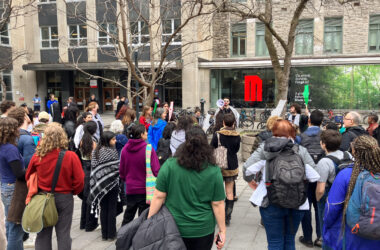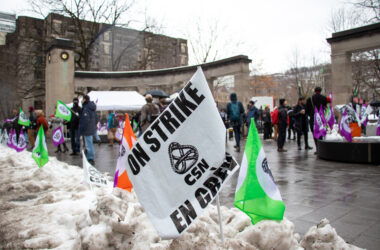Divest 101, an information session held by the student group Divest McGill, took place on Jan. 21, drawing a crowd of around 40 students to a Burnside basement classroom. The meeting was led by members Guido Powell and Rachel Ivey, who discussed the group’s response to McGill’s plans to decarbonize. The meeting emphasized the importance of continued action, despite the Board of Governors’ (BoG) repeated decisions against fossil fuel divestment.
Following a report by the Committee to Advise on Matters of Social Responsibility (CAMSR), McGill Principal and Vice-Chancellor Suzanne Fortier announced that the university would not be withdrawing its close to $148 million investment in the fossil fuel industry. This marks the third time that McGill has rejected community demands, choosing instead to decrease the number of investments it has in the fossil fuel industry.
For Divest McGill members like Millie Murray, U0 Science, McGill’s repeated decision to maintain its sizeable holdings in fossil fuel companies has fallen short of expectations.
“Most recently, [McGill] responded [to calls for divestment] by essentially saying divestment is superficial and we don’t need to do it,” Murray said. “And then they released this statement […] about their commitment to carbon neutrality, but it is all very vague.”
The BoG has committed to taking several steps towards their goal of carbon neutrality, such as reducing the carbon footprint of the McGill Investment Pool and increasing investments in the school’s fossil-fuel-free fund. However, according to Audrey Nelles, U0 Science, the university has not adequately addressed student demands.
“We, as students, should expect a lot of our university and divestment is kind of the bare minimum in terms of climate justice,” Nelles said.
As part of a growing movement, over 1000 institutions around the world have divested from fossil fuels. In some instances, students have resorted to more public tactics to get the attention of their university’s administration. At the University of British Columbia, a group of students participated in a hunger strike for divestment. During a recent Harvard-Yale football game, student environmental activists garnered international attention by storming the field. Nelles spoke on previous attempts coordinated by Divest McGill in garnering the same attention.
“In the past, Divest has occupied the office of the principal, we have camped out outside of James Admin, [and have] returned [our] diplomas,” Nelles said. “I think that [it is] important to continue doing these public actions because that does put a lot of pressure on the university.”
While members of Divest McGill were unwilling to divulge details regarding the group’s specific plans for the coming year, this most recent refusal to divest by the university has prompted the group to consider alternative actions. Ella Wischnewsky, U1 Arts, explained that the group’s current focus will be to pressure the McGill administration in more impactful ways.
“As far as working with [McGill], we are still doing that in a way but at least in this coming semester, we are looking to do a little bit more of escalation tactics [in our protests],” Wischnewsky said.
Despite the decision from the BoG, support for divestment is still strong on campus. The resignation of tenured faculty professor Gregory Mikkelson drew national attention, while the creation of the Paid by McGill video spread awareness for Divest McGill’s cause. Actions concentrated on drawing public attention to McGill’s continued investment in fossil fuels will be essential components of the group’s unrelenting eight-year-long campaign for divestment.
“[McGill] is very concerned with their image,” Nelles said. “If we show the other side of that image [and show] that, no, McGill is not a leader in sustainability [and] they are actually contributing to climate change, then that has a lot of power.”









